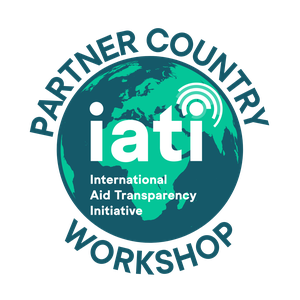IATI Workshops in Kigali: Advancing data use by governments
Last week, IATI hosted two workshops to advance the use of IATI data amongst partner countries.

The meetings were held in collaboration with the government of Rwanda, an incoming IATI Governing Board member.
Representatives from 13 governments joined a two-day workshop in Kigali (on 17-18 May), which was followed by a workshop with key experts on integrating IATI data into partner countries’ aid information management systems (19-20 May).
IATI Partner Country Workshop
At the Partner Country Workshop, IATI members joined from the governments of Benin, Burkina Faso, Chad, Colombia, Guinea, Honduras, Lesotho (observer), Liberia, Malawi, Nepal, Nigeria, Rwanda and Sierra Leone. Representatives explored how to use IATI data as a complement to data available at the national level. They discussed how this data could improve governments’ visibility of billions of dollars of external development and humanitarian resources, and ensure more effective planning, budgeting and coordination.
At the meeting, Gerald Mugabe, Ag. Director General of the External Finance Directorate, in Rwanda’s Ministry of Finance and Economic Planning said, “We are tremendously proud to host this meeting of the International Aid Transparency Initiative. As a longstanding member of IATI, and a new member of its Governing Board, we wholeheartedly support IATI’s mission of increasing the transparency of, and access to data on development finance”.
This workshop has reaffirmed developing country governments’ keen interest in using IATI data to supplement the information available for aid management in their countries.
“This workshop has reaffirmed developing country governments’ keen interest in using IATI data to supplement the information available for aid management in their countries. We look forward to working with IATI to strengthen its offer to governments to increase the visibility of development flows”.
Key takeaways
At the workshop, representatives received training on accessing and analysing IATI data and specifically focused on using IATI’s Country Development Finance Data tool. The tool was developed in 2021 in collaboration with national stakeholders, with the aim of providing the data most needed by partner country governments and other country-level data users. Many participants expressed their interest in using IATI to supplement their own national data going forward, and discussed challenges they currently experience in meeting their development finance data needs at the country level. Participants underlined that:
- IATI data is increasingly in demand as development partners have become less responsive to direct data requests by governments. However, representatives underscored the importance of country ownership, seeing IATI data as a complement to national accountability systems already in place at the country level between partners and government.
- Long-standing issues with the quality of IATI data, including variations in the way development partners publish data, still present a challenge to use of the data at the country level. To be more useful to partner country governments, access to IATI data needs to be simplified, moving from many tools into one consolidated and user-friendly data portal.
- There is still a desire for integration of countries’ Aid Information Management Systems (AIMS) with IATI data. However data quality challenges, including the need to localise data to national contexts, among other challenges, remain a barrier to realising integration in practice.
The IATI Secretariat is currently drafting a summary report to provide comprehensive details about the Workshop and this will be published shortly. Going forward, the partner country representatives are keen to continue learning and collaborating via face-to-face and virtual meetings. They also expressed an interest in using future IATI events to strengthen the dialogue between governments and IATI publishers.
IATI AIMS Workshop
Colleagues from Liberia, Nepal, and Rwanda, and AIMS experts, including representatives from three AIMS service providers (Catalpa, Development Gateway and Synergy) joined the IATI AIMS Workshop. The workshop was held to deep dive into the current challenges and potential solutions for making IATI data more accessible and usable for partner country governments through integration with their national AIMS.
Here are the key takeaways from their discussions:
- Overall, governments are still interested in integrating IATI data into their AIMS as it would enable a more holistic picture of external development finance flows. However it was acknowledged not all governments have functioning AIMS, which also creates the need for complementary solutions.
- Ongoing issues with the quality of IATI data have made integration challenging in practice and further work by the IATI community and Secretariat is required to continue improvements to data quality in order to realise integration.
- To achieve integration, there needs to be an increase in technical support to governments and access to a reliable and sustainable IATI technical infrastructure.
- With the exception of the Liberia Project Dashboard, there are currently no known integrations that are being used on an ongoing basis. Having a proof-of-concept of a successful AIMS integration could help raise the political will of governments to invest in implementing their own integrations, and potentially also for IATI to invest further in the frameworks that would support governments to undertake this work.
The IATI Secretariat and the AIMS service-providers agreed on a number of concrete actions they could take in the short term to overcome some of the challenges outlined above. The IATI Secretariat will use the information from the workshop (and previous research and views) to create an IATI AIMS strategy for consideration by IATI’s Governing Board. This will outline the recommendations for how the initiative could address the issue of AIMS integration going forward.
For support using IATI data visit IATI’s Data Use Query Corner or email IATI’s Helpdesk: [email protected]. You can also stay up-to-date with news, events and discussions on activities to improve the use of IATI data by joining the Data Use Communities of Practice on IATI Connect.